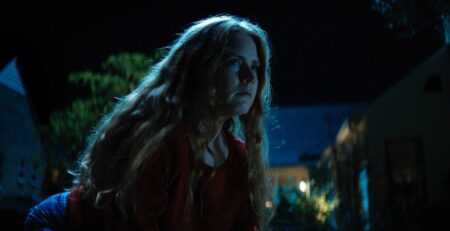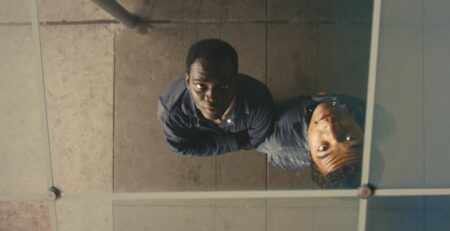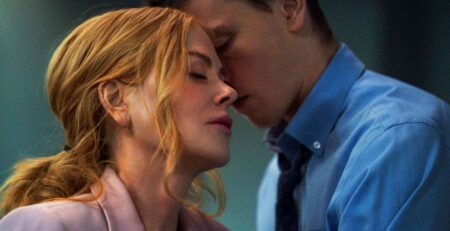
The White Fortress (Tabija) is a Bosnian film by Igor Drljaca about two kids who never should have met and never should have fallen in love, but do anyway. Faruk (Pavle Cemerikic) was orphaned as a child and lives in near squalor with his grandmother, scrapping with his uncle (Jasmin Geljo) and taking jobs from his cousin Almir (Kerim Cutuna) escorting teenage prostitutes to get by. Mona (Sumeja Dardagan) is the daughter of people with great political power and no love in their hearts. The two meet at just the right and wrong times. Mona is being forced to move to Toronto to live with her aunt and uncle when the school year ends. Faruk is being pressured to find a girl to coax into prostitution to appease their boss. But they fall in love anyway.
The White Fortress is the slowest of slow-burning stories. It moves at a glacial pace, at times merrily, at others lugubriously. Scenes are prolonged to the point of discomfort. But that’s how time moves when you’re a teen stuck in a dismal circumstance and yearning for something greater. The two leads play this so well, both together and apart. Apart, they’re just doing what they have to to get along with their situations. Together, they’re awkward, slow, quiet, and uncertain. It aches of teenage love in the most believable and endearing way, even as you pang for how little it offers in the way of forward movement.
The White Fortress is a Romeo and Juliet story in some intentionally overt ways. You’re just waiting for the other shoe to drop and something terrible to happen to one character or the other. I spent much of the film’s first three-quarters assuming tragedy would pass. But my expectations were consistently bucked as the characters’ tenderness towards one another was foiled by growing and vocal disdain for the world around them. Ultimately, Faruk and Mona weren’t just two teens consigned to any particular fate, a quality in this film that I respect enormously.
It is certainly a dragging film that takes a lot of pride in its meticulous shots. Were it any longer than the brief 90 minutes or so it occupies, this would have become rather loathsome. But in its brevity, mirroring the cosmically short timespan the story takes place over, the artisanal camera work can be admired. And it certainly should be. There are many moments where the camera plays with the sun’s natural light to create flares that perfectly match the mood of the moment. There are also a host of different camera movements, from shakey cams to swinging shots, that show off the gorgeous landscape of Sarajevo. But it’s the timelapse spanning a sunset, a moonrise, and a sunrise that absolutely stunned me for both its beauty and its creativity. I would nominate that shot for awards in a heartbeat and watch it on repeat for how visually and emotionally stunning it is.
The film undoubtedly benefited from the natural beauty of its landscape, but I also must applaud its costuming. Its Gen Z characters are constantly dressed in outfits absolutely reflective of the generations’ fashion tastes and expressions, from the colorfully striped shirts to the wide-cuffed pants. It’s always immediately captivating when the costuming for young people reflects the expressions of the times, especially since it doesn’t feel like I see it all that consistently.
The score is noteworthy as well. Music plays an integral part in Faruk’s life, so the way that aspect of his character is blended in his home life with the score presented in the rest of the scenes is a swell use of music to carry emotions. It’s just also a lovely score that helps underpin the sensitivity of Faruk and Mona’s enrapture.
The White Fortress is a slow, sometimes overwrought and self-indulgent, gorgeous rejection of Romeo and Juliet’s binds to a tragic fate. It’s visually stunning with incredible camera work, and its script and acting are strikingly befitting of the age and circumstances of its characters.
The White Fortress (Tabija) is now available to rent or purchase via Apple TV.
The White Fortress (Tabija)
-
Rating - 8/108/10
TL;DR
The White Fortress is a slow, sometimes overwrought and self-indulgent, gorgeous rejection of Romeo and Juliet’s binds to a tragic fate. It’s visually stunning with incredible camera work and a script and acting that are strikingly befitting the age and circumstances of its characters.




